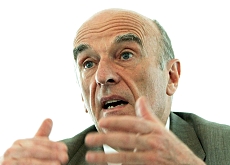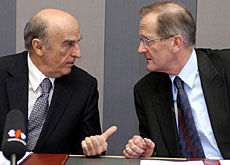
Swiss unfazed by planned IMF reform

The International Monetary Fund (IMF) has given the go-ahead for a plan to grant China and other emerging economies a bigger role in its 184-member organisation.
Finance Minister Hans-Rudolf Merz has welcomed the reforms but says it will have a limited impact on Switzerland.
The strategy was endorsed by the IMF’s steering committee during a meeting in Washington on Saturday.
The conference asked IMF managing director Rodrigo Rato to present a plan by September aimed at re-allocating the voting power, or quotas, of certain countries, notably emerging market economies.
They include China, India, Brazil, South Africa, Turkey, Mexico as well as South Korea which have repeatedly called for a bigger role within the IMF.
Unlike other international organisations, the voting shares of member states of the IMF are proportional to their economic weight in the global economy.
More efficient
Switzerland’s vote currently weighs at about 1.6 per cent in the IMF and the World Bank, and also represents a voting group of eight countries in central Asia and eastern Europe.
Merz told swissinfo that the reforms, which were supported by the United States, Canada and Britain during Saturday’s IMF meeting, were important to increase the efficiency of the organisation.
However, experts expect the changes to the voting power to be made at the cost of European countries, which appear reluctant to scale back their votes.
“Switzerland is ready to contribute to the planned reform, but IMF member states are still some time away from reaching a consensus on the details,” said Merz.
He pointed out that the mandate for Rato to increase the voting power for the time being applies only to certain, most striking cases of misrepresentation.
China for instance has voting share of only three per cent, similar to the Netherlands; or Brazil which weighs at 1.4 per cent behind Switzerland.
Price to pay
Merz says he is aware that the reforms could possibly weaken Switzerland’s voting power within the IMF.
“This is the price we have to pay for the reform, but I’m confident that we will not suffer a major loss in voting power.”
The reforms face a series of political hurdles before they can take effect.
“It takes 85 per cent of the member countries to approve the changes. The US government [the country with the largest single vote] needs to win the approval of the Congress before it can agree to anything.”
swissinfo, Marie-Christine Bonzom in Washington
Switzerland has been a member of the World Bank and the International Monetary Fund since 1992.
The country sits on the executive boards of both institutions and leads a voting group which includes Azerbaijan, Uzbekistan, Kyrgyzstan, Poland, Serbia-Montenegro, Tajikistan and Turkmenistan.
The World Bank provides loans, technical assistance and institutional advice, while the IMF promotes monetary cooperation, financial stability and crisis prevention.
The spring meetings of the IMF and World Bank are being held in Washington on April 22 and 23.
The Swiss delegation was led by Finance Minister Hans-Rudolf Merz.
Switzerland holds a 1.6% share in voting power.

In compliance with the JTI standards
More: SWI swissinfo.ch certified by the Journalism Trust Initiative



































You can find an overview of ongoing debates with our journalists here . Please join us!
If you want to start a conversation about a topic raised in this article or want to report factual errors, email us at english@swissinfo.ch.